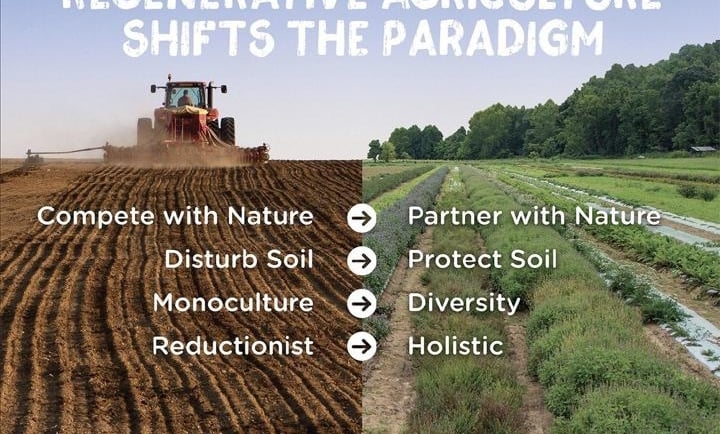The Lost Wisdom of Sustainable Agriculture: From Jefferson to Vandana Shiva’s Call for Regeneration
This blog explores the timeless wisdom of agriculture as viewed by Thomas Jefferson and modern environmental activist Vandana Shiva. Jefferson saw agriculture as the foundation of real wealth, morality, and happiness, while Shiva critiques the industrial revolution for losing the vital knowledge of conservation and regeneration. By bridging these perspectives, we can restore our relationship with the Earth through sustainable, regenerative practices that nurture both people and the planet.
9/26/20244 min read


The Lost Wisdom of Sustainable Agriculture: From Jefferson to Vandana Shiva’s Call for Regeneration
Thomas Jefferson once said, "Agriculture is our wisest pursuit because it will in the end contribute most to real wealth, good morals, and happiness." Jefferson’s admiration for agriculture was rooted in the belief that working the land fostered independence, virtue, and a deep connection to nature. In the early days of America, farming was not just an economic activity—it was a way of life that encouraged sustainability, self-sufficiency, and stewardship of the Earth.
However, as society transitioned into the industrial age, much of this wisdom was lost. Vandana Shiva, a renowned environmental activist, speaks of this shift: "Knowledge of exploitation was the narrative for the industrial revolution; where the vital knowledge of conservation, rejuvenation, and regeneration was lost." The industrial revolution brought with it an era of rapid growth and technological advancement, but it also set humanity on a path of environmental degradation and unsustainable practices. In this blog, we’ll explore the juxtaposition of these two perspectives—the agrarian ideal of Jefferson and Shiva’s critique of industrial exploitation—and examine how we can reclaim the knowledge of regeneration to create a sustainable future.
Jefferson’s Vision: Agriculture as the Foundation of Society
For Jefferson, agriculture was more than an economic activity—it was a moral and philosophical pursuit. In his time, the vast majority of Americans lived and worked on farms. Jefferson believed that this connection to the land instilled values of hard work, self-reliance, and a respect for nature. He viewed farmers as the backbone of the nation, seeing agriculture as a source of true wealth that provided sustenance and nurtured the human spirit.
Agriculture, in Jefferson's mind, contributed to good morals because it fostered a lifestyle based on simplicity and independence. Unlike commerce or industry, which could lead to greed and inequality, farming provided a direct relationship between effort and reward. The land gave back to those who cared for it, creating a harmonious cycle of labor and fulfillment.
Moreover, Jefferson saw agriculture as a path to happiness. Working the land allowed individuals to engage with nature in a meaningful way, promoting physical and mental well-being. The rhythm of planting, cultivating, and harvesting tied people to the cycles of the seasons, grounding them in the natural world.
Yet, the wisdom embedded in this agrarian ideal was not just about individual satisfaction; it was about the sustainability of society itself. Jefferson’s vision was one where land was preserved, cultivated responsibly, and passed on to future generations in better condition than it was found. He knew that the health of the land was directly tied to the health of the nation.
The Industrial Revolution: Knowledge of Exploitation
Fast forward to the industrial revolution, and much of Jefferson’s agrarian wisdom was pushed aside in favor of rapid expansion, mechanization, and urbanization. The rise of factories and mass production led to enormous economic growth, but it came at a steep cost. Vandana Shiva’s critique of this era highlights the environmental and social consequences of this shift: "Knowledge of exploitation was the narrative for the industrial revolution."
Shiva’s argument centers on the fact that the industrial revolution prioritized extraction over regeneration. Rather than working with nature, industries sought to dominate and control it. Forests were cleared, rivers were dammed, and resources were extracted at unsustainable rates to fuel factories and urban expansion. In the process, the knowledge of how to conserve and regenerate the land was lost.
This exploitation extended beyond the land to the people as well. The industrial revolution created vast inequalities, as workers were subjected to harsh conditions in factories, and traditional farming communities were uprooted. The connection between humans and the land was severed, and with it, the values of stewardship and sustainability that had once guided agricultural societies.
Vandana Shiva’s Call for Regeneration
Vandana Shiva’s work represents a call to return to the wisdom that was lost during the industrial revolution. She advocates for a shift away from exploitative practices toward a regenerative approach to agriculture and society as a whole. In her view, true wealth does not come from extracting as much as possible from the Earth, but from nurturing it and allowing it to rejuvenate.
Shiva emphasizes the importance of conservation, rejuvenation, and regeneration—principles that align closely with Jefferson’s agrarian ideals. Conservation involves preserving the natural resources we have, ensuring they are available for future generations. Rejuvenation refers to the active restoration of ecosystems that have been damaged by industrial practices, bringing them back to health. Regeneration goes a step further, focusing on creating systems that are not just sustainable but also capable of renewing themselves over time.
For Shiva, the wisdom of regenerative agriculture lies in working with nature rather than against it. This means embracing biodiversity, using organic farming methods, and prioritizing the health of the soil, water, and ecosystems. It also involves recognizing the value of traditional farming knowledge, much of which was dismissed during the industrial revolution but holds the key to sustainable food production and environmental stewardship.
Reclaiming the Lost Knowledge
So how do we bridge the gap between Jefferson’s agrarian ideal and Shiva’s call for regeneration in a world that still largely follows the exploitative model of the industrial revolution?
First, we need to rethink our relationship with the land. Agriculture should once again be seen as a pursuit of wisdom, one that involves nurturing the Earth rather than extracting from it. This requires a shift in mindset—from seeing nature as a resource to be exploited to viewing it as a living system that we are a part of and have a duty to protect.
Second, we must embrace regenerative practices in agriculture and beyond. This means investing in sustainable farming methods that restore the health of the soil, reduce chemical inputs, and promote biodiversity. It also means supporting local food systems and reducing our reliance on industrial agriculture, which prioritizes profit over the health of people and the planet.
